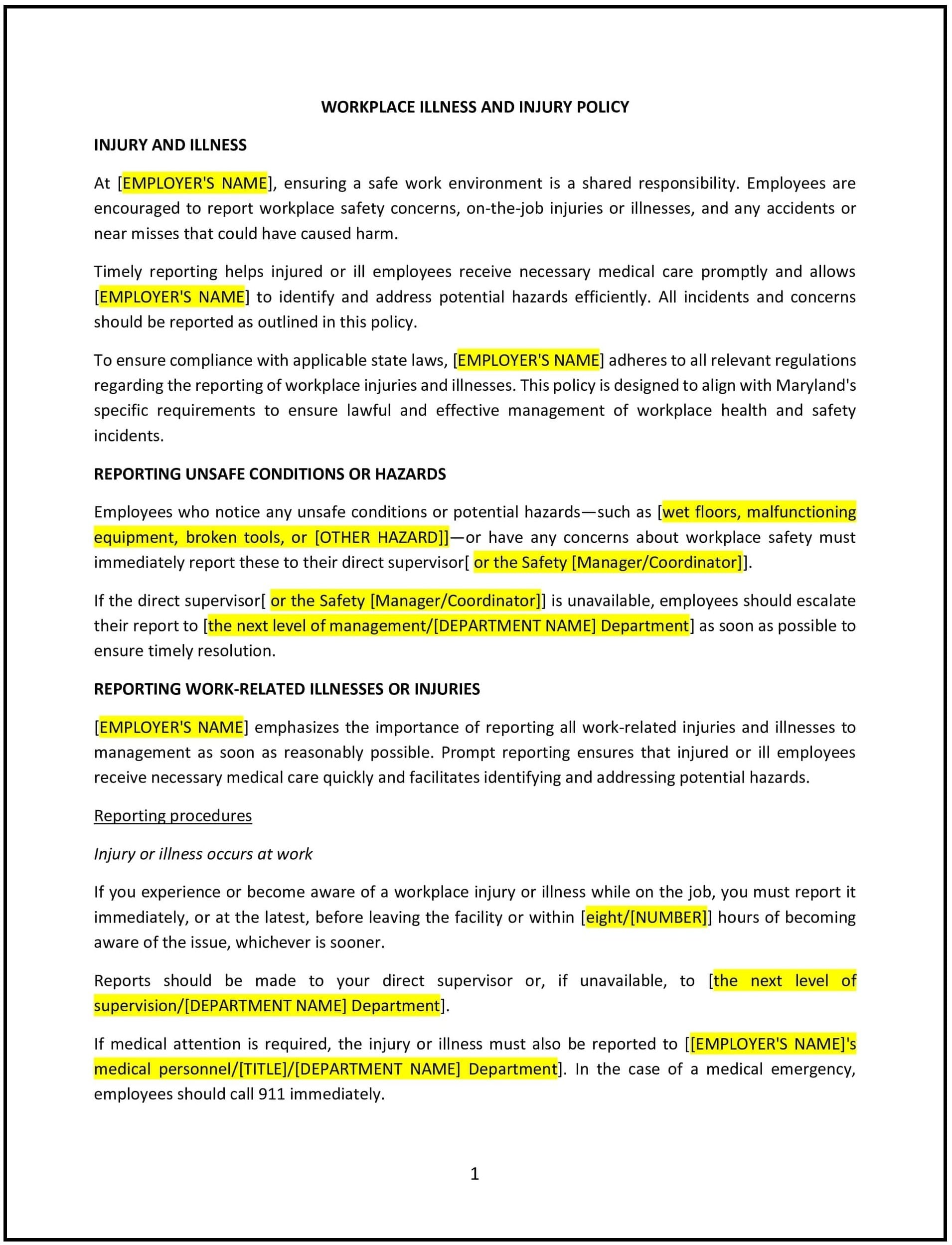Workplace illness and injury policy (Maryland): Free template
Got contracts to review? While you're here for policies, let Cobrief make contract review effortless—start your free review now.

Customize this template for free
Workplace illness and injury policy (Maryland)
This workplace illness and injury policy is designed to help Maryland businesses protect employees' health and safety by outlining procedures for managing workplace injuries and illnesses. It specifies the steps for reporting injuries, accessing medical care, and managing workers’ compensation claims, while supporting compliance with state and federal regulations.
By adopting this policy, Maryland businesses can create a safer work environment, mitigate risks related to workplace injuries, and ensure the well-being of employees.
How to use this workplace illness and injury policy (Maryland)
- Define workplace illness and injury: Clearly outline what constitutes a workplace injury or illness, including both physical injuries (e.g., slips, trips, falls) and illnesses (e.g., exposure to harmful substances, infectious diseases).
- Set reporting procedures: Specify the steps employees must take when they experience an injury or illness, including who to report to, how quickly it should be reported, and any required documentation.
- Outline medical care procedures: Detail how employees should access medical treatment, including the company’s role in facilitating care and any restrictions on seeking care from specific providers.
- Establish workers’ compensation procedures: Provide guidance on how to file a workers’ compensation claim, including the necessary documentation and timelines for reporting and processing claims.
- Specify leave policies: Address how workplace illness and injury leave is handled, including paid or unpaid leave, and whether employees can use sick leave, vacation, or other benefits during recovery.
- Reflect Maryland-specific considerations: Ensure that the policy aligns with Maryland's workers' compensation laws, occupational health and safety regulations, and any local laws related to employee illness or injury.
Benefits of using this workplace illness and injury policy (Maryland)
Implementing this policy provides Maryland businesses with several advantages:
- Promotes employee health and safety: Clearly communicates the company’s commitment to maintaining a safe and healthy workplace for all employees.
- Reduces liability: Helps businesses manage legal risks related to workplace injuries by ensuring compliance with Maryland workers’ compensation laws and occupational safety regulations.
- Enhances employee well-being: Ensures that employees receive the necessary support and care in the event of an illness or injury, which can improve morale and trust in the company.
- Streamlines the claims process: Provides employees with a clear procedure for reporting injuries and accessing workers' compensation, reducing delays and confusion.
- Aligns with Maryland regulations: Ensures the business complies with all Maryland-specific occupational health, safety, and workers’ compensation laws, reducing the risk of legal disputes.
Tips for using this workplace illness and injury policy (Maryland)
- Communicate the policy clearly: Ensure that employees understand the reporting process, their rights under workers' compensation, and the steps for accessing medical care if they are injured or ill.
- Provide training: Offer regular safety training and ensure that all employees are informed about the risks associated with their job and how to prevent injuries or illnesses.
- Encourage early reporting: Encourage employees to report injuries or illnesses immediately, even if the condition seems minor, to prevent complications and ensure prompt treatment.
- Maintain accurate records: Keep thorough records of all workplace injuries and illnesses, including reports, medical treatment, and workers’ compensation claims, for compliance and future reference.
- Review regularly: Regularly update the policy to reflect changes in Maryland laws, workplace safety practices, or business needs.